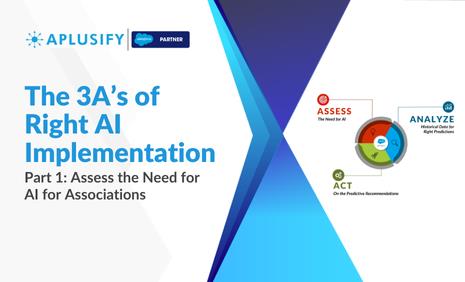1. Assess- The Need for AI
Before implementing AI for your association, it is crucial to identify the specific needs and how AI can add value. Find out the specific pain points that you want to resolve with AI- for example member engagement, membership retention, donations, and streamlining operations. Here’s how you can assess the need for AI within your association:
a. Identify Pain Points and Opportunities
This includes identifying the association’s specific requirements and challenges that Salesforce Einstein AI is supposed to address. Associations must pinpoint workflows that AI will add more value like predicting member churn, creating personalized engagement strategies and automating member support.
b. Improve Member Engagement and Retention with Targeted Strategies
Using Artificial Intelligence algorithms, associations can identify patterns in member data that indicate potential churn. This includes tracking membership renewal, event attendance and content preferences. Using these insights, associations can create targeted strategies to boost engagement and retention.
c. Predict at-risk Members and Provide Personalized Recommendations
Artificial Intelligence algorithms can analyze vast amounts of member data like demographics and engagement history to derive patterns in engagement. They can then predict the members at risk of disengagement or churn. Based on this predictive analysis, AI assigns risk scores to members like high, low or medium based on their probability of churn. Based on this segmentation, associations can send personalized mails or offers to members who are more likely to churn.
2. Analyze-Historical Data for Predictions
Historical data is the cornerstone for predicting member engagement with associations. By analyzing historical data including past member behavior and trends, you can predict future engagement. This includes membership renewal, event attendance, content interactions and donations. The quality and relevance of the predictions depends on the data available from the different databases like CRM, social media interactions, learning management systems, financial transactions, etc. Here are the steps to analyze historical data:
a. Identify Data Sources Based on Objectives
Ensure that the data sources align with your prediction objectives. For example, if you want to improve member retention, focus on databases like member engagement, membership renewals, and event attendance. Combine data from these sources to get a comprehensive view of member engagement.
b. Collect and Cleanse Data for Accurate Predictions
While collecting data from different sources, make sure that the sources are reliable and consistent. Remove erroneous, inaccurate or duplicate data and make sure that it is consistent and structured. You can also enhance data with additional information like demographic information or social media activity of members. Clean data forms the foundation for accurate predictions.
c. Maintain Data Security Standards
Associations store sensitive member information hence maintaining data security is paramount to retaining member trust. Adhere to data protection regulations to avoid legal issues. Ensure proper access control so that authorized people get access to data. Conduct regular audits to address vulnerabilities and maintain robust data security protocols.
3. Act- On the Predictive Recommendations
Once the predictive insights are ready, your association can transform these insights into actionable strategies. Based on the different member segments, you can personalize engagement efforts and monitor outcomes to maximize value. Here’s how you can act on the predictive recommendations:
a. Segment Members Based on Predictive Scores
Using predictive scores, you can segment members into different categories like moderately engaged, less engaged or at-risk. Create detailed profile based on this segmentation that highlights member behavior, preferences and engagement patterns. You can create targeted engagement strategies based on this segmentation to reengage members who are at-risk.
b. Personalize Engagement for at-Risk Members Using Gen AI
Enhance your personalization efforts using Generative AI. Schedule automated personalized messages, email or content based for at-risk members based on their interests. These messages can be around lapsed membership, event recommendations, or personalized incentives and discounts for early renewal.
c. Implement Changes and Monitor Engagement
Monitor the implemented changes closely to measure its impact on the association. Using the Member Engagement Dashboard, you can track key metrics for member engagement like event participation, membership renewal rates, etc. You can also refine your strategies and test new ones based on these insights.
This overview blog initiates our series, “3As for Right AI Implementation for Associations.” In the upcoming blogs, we’ll dive into Assess, Analyze, and Act, exploring their critical roles in successful AI integration for associations. Stay tuned to discover how these steps can transform your member experience.

